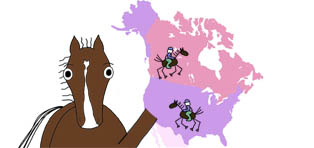by Joe Ferriss
photos from the Ferriss and Melzac collections except where otherwise noted
Last year marked the 50th anniversary of the importation to the U.S. of the first get of Nazeer. The importer was Richard Pritzlaff, an intensely passionate man who loved the Arabian horse and understood the merits of all its best qualities.
Richard was consumed by all things interesting and beautiful. His collection of art was second to none. He lived on a magnificent sprawling ranch in the New Mexico high country below Hermit’s Peak, called Rancho San Ignacio that he had owned since the mid 1930s. After a riding accident on a Paint horse, he decided he needed a more agile and durable mount and had been impressed by the Arabians he had seen. In a simple twist of fate he became acquainted with Carl Raswan and enjoyed riding in the countryside on some of Raswan’s Arabians. Raswan had lived among the Bedouin tribes, as well as in Egypt. He had traveled globally and had selected horses for important breeders in the U.S. Europe and Poland. Raswan was known for his excellent eye for a horse as well as his vast knowledge of the history of the Arabian. He was an exceptional resource for helping Richard choose his first Arabian horse. Richard had first obtained a riding horse from Raswan, the Arabian stallion Muntez which was used to produce AngloArabians.
But Richard wanted to breed purebreds so Raswan located a grey filly named Rabanna (Rasik x Banna by Nasr), born 1947. She was of special interest for being of the increasingly rare early Crabbet breeding prior to the popular and heavy use of Skowronek at Crabbet. It was also desirable that Rabanna carried exceptionally high percentages of Abbas Pasha and Ali Pasha Sherif blood. In addition, she was a granddaughter of the famed stallion Nasr (Rabdan El Azrek x Bint Yamama by Saklawi II) who was imported from Egypt by W.R. Brown in 1932. She was a remarkable parallel to some of the horses bred in Egypt decades before here time, though two of her distant ancestors did not breed on in the asil stock of Egypt...
Read more here:
http://desertheritagemagazine.com/NEW/articles/breeder/15_Pritzlaff.pdf

No comments:
Post a Comment